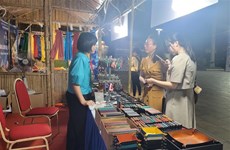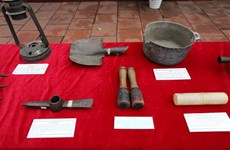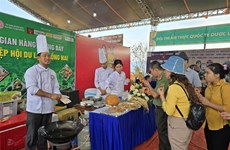Infrastructure improves Khmer standard of living
Hundreds of Khmer farmers in the Mekong Delta province of Tra Vinh are
no longer poor as they have taken advantage of new roads, electrical
systems and dredging of canals to earn higher incomes.
Hundreds of Khmer farmers in the Mekong Delta province of Tra Vinh are
no longer poor as they have taken advantage of new roads, electrical
systems and dredging of canals to earn higher incomes.
In the province's Tra Cu district, where 75 percent of the people are Khmer, 496 farmers have been recognised as having achieved good agricultural production, with annual turnover ranging from 50 million VND (2,400 USD) to 350 million VND (16,800 USD) per household.
Before 2000, 60 percent of the district's population was poor, according to Kim Ngoc Chau, deputy chairman of the district's Ethnic Minorities Division.
"There were several changes that created a solid base for the Khmer community, such as road construction, connection to the national power grid and dredging of canals," said Chau, who is Khmer.
"But the key was the change in mindset of the Khmer community. They were no longer contented with only rice production. People began to consider which crops would give them more income and paid attention to market demand so they could make adjustments in what they plant."
Thach Dan, 60, of the district's Ham Tan Commune earns an average income of 200 million VND (9,615 USD) a year from his sugarcane fields.
Before 2000, Dan had planted cabbage and chili peppers and raised ducks on a 10,000sq.m of land inherited from his parents.
"At that time, I earned enough for six children to go to school and university, so I didn't want to change anything," said Dan.
"But when my children graduated and got stable jobs in Government agencies, I started paying more attention to the demand from sugar factories."
The dredging of nearby Rach Ca Canal inspired Dan to buy more land to plant sugarcane. He now earns 2-3 million VND on each 1,000sq.m of his 16,000sq.m of sugarcane fields.
In Dai An, another commune in the district, Khmer farmer Ha Van Rem and 58 other farmers are expanding their taro fields as market demand is on the rise.
In the past, Rem and his neighbours only knew rice cultivation.
"In 1997, I found that taro could grow well on my land and brought me more income. I began to plant taro in a wide area and encourage my neighbours to work with me," he said.
Rem and his neighbours are cultivating taro, rice, sweet corn or vegetables on 161,000sq.m, earning an annual income of around 80 million VND each.
Giang Na Rong, deputy chairman of the district Farmers' Association, said the association will continue to support farmers with loans from the Bank for Social Policy.
It would also cooperate with the Agriculture Division to offer training on seedlings, cultivation and pesticide prevention so that farmers could expand production, Rong said.
The association has encouraged farmers to take part in handicraft cooperatives for more income and preserve traditional handicrafts as well.
A mat making cooperative of 50 families has brought jobs to female farmers when they are not occupied with farmwork.
Today, farmers in the province no longer want to move to industrial provinces like Binh Duong, where factories are recruiting more workers. The handicraft jobs and new crops are earning them more than enough money. /.
In the province's Tra Cu district, where 75 percent of the people are Khmer, 496 farmers have been recognised as having achieved good agricultural production, with annual turnover ranging from 50 million VND (2,400 USD) to 350 million VND (16,800 USD) per household.
Before 2000, 60 percent of the district's population was poor, according to Kim Ngoc Chau, deputy chairman of the district's Ethnic Minorities Division.
"There were several changes that created a solid base for the Khmer community, such as road construction, connection to the national power grid and dredging of canals," said Chau, who is Khmer.
"But the key was the change in mindset of the Khmer community. They were no longer contented with only rice production. People began to consider which crops would give them more income and paid attention to market demand so they could make adjustments in what they plant."
Thach Dan, 60, of the district's Ham Tan Commune earns an average income of 200 million VND (9,615 USD) a year from his sugarcane fields.
Before 2000, Dan had planted cabbage and chili peppers and raised ducks on a 10,000sq.m of land inherited from his parents.
"At that time, I earned enough for six children to go to school and university, so I didn't want to change anything," said Dan.
"But when my children graduated and got stable jobs in Government agencies, I started paying more attention to the demand from sugar factories."
The dredging of nearby Rach Ca Canal inspired Dan to buy more land to plant sugarcane. He now earns 2-3 million VND on each 1,000sq.m of his 16,000sq.m of sugarcane fields.
In Dai An, another commune in the district, Khmer farmer Ha Van Rem and 58 other farmers are expanding their taro fields as market demand is on the rise.
In the past, Rem and his neighbours only knew rice cultivation.
"In 1997, I found that taro could grow well on my land and brought me more income. I began to plant taro in a wide area and encourage my neighbours to work with me," he said.
Rem and his neighbours are cultivating taro, rice, sweet corn or vegetables on 161,000sq.m, earning an annual income of around 80 million VND each.
Giang Na Rong, deputy chairman of the district Farmers' Association, said the association will continue to support farmers with loans from the Bank for Social Policy.
It would also cooperate with the Agriculture Division to offer training on seedlings, cultivation and pesticide prevention so that farmers could expand production, Rong said.
The association has encouraged farmers to take part in handicraft cooperatives for more income and preserve traditional handicrafts as well.
A mat making cooperative of 50 families has brought jobs to female farmers when they are not occupied with farmwork.
Today, farmers in the province no longer want to move to industrial provinces like Binh Duong, where factories are recruiting more workers. The handicraft jobs and new crops are earning them more than enough money. /.













